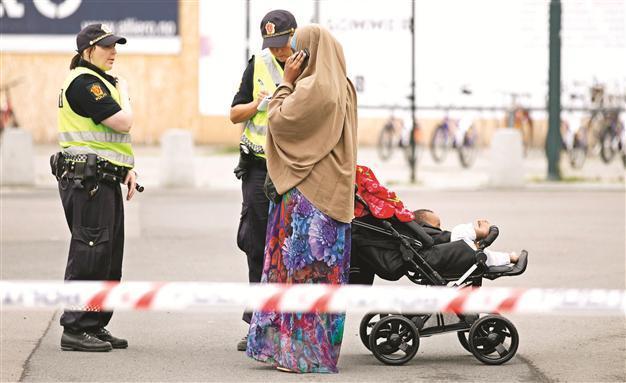Europe excluding Muslims: report
LONDON

Police take down the details of a Muslim woman near Oslo in this file photo. Some European Muslims are denied employment and educational opportunities because of cultural and religious stereotypes that lead to discrimination against them, Amnesty’s report says. REUTERS photo
European countries are discriminating against Muslims for openly exhibiting their faith, especially in the areas of education and employment, human rights group Amnesty International has said in a recent report.
In a report focusing on Belgium, France, the Netherlands, Spain, and Switzerland, Amnesty urged European governments to do more to challenge negative stereotypes of and prejudices against
Islam. The report was particularly critical of countries that have brought in outright bans on face-covering veils or on the wearing of religious symbols in schools.
“Rather than countering these prejudices, political parties and public officials are all too often pandering to them in their quest for votes,” said Marco Perolini, Amnesty International’s expert on discrimination. “
Muslim women are being denied jobs and girls prevented from attending regular classes just because they wear traditional forms of dress, such as the headscarf. Men can be dismissed for wearing beards associated with Islam.” The report, titled “Choice and prejudice: discrimination against Muslims in
Europe,” said legislation prohibiting discrimination in employment has not been properly implemented in Belgium, France and the Netherlands.
Direct conflict with EU lawEmployers had been allowed to ban religious or cultural symbols on the grounds that they would annoy clients or colleagues, or that it conflicts with a company’s corporate image or supposed neutrality, it said, according to Agence France-Presse. Amnesty said this was in direct conflict with European Union law. “EU legislation prohibiting discrimination on the grounds of religion or belief in the area of employment seems to be toothless across Europe, as we observe a higher rate of unemployment among Muslims,” Perolini said. This was especially true among Muslim women of foreign origin, he added.
In France in 2009, the employment rate for women holding French citizenship was 60.9 percent. The rate for Moroccan women in the country was 25.6 percent, and for Turkish women 14.7 percent. In the Netherlands in 2006, the employment rate for women of Turkish and Moroccan origin was 31 and 27 percent respectively, compared with a rate of 56 percent for Dutch women who are not from ethnic minorities.
Turkey’s partThe report said governments around Europe should avoid introducing general bans on the wearing of religious and cultural symbols and dress in educational environments. For Turkey’s part, the report criticized the country’s restrictions on the wearing of the headscarf at institutions of higher education. “By maintaining policies and legislation enshrining a general prohibition on the headscarf and other religious and cultural symbols and dress in higher education, Turkey violates the rights to freedom of religion or belief and of expression of those who freely chose to manifest their religious or cultural belief.” The restrictions are linked to the strong secular tradition established in the country from the founding of the Republic.
“Adult students excluded from higher education only because they wear religious and cultural symbols and dress are discriminated against on the grounds of religion or belief in access to education.” The report recommends that Turkey amend the Law on Higher Education with the aim of allowing adult students in higher education to wear religious and cultural symbols and dress.
